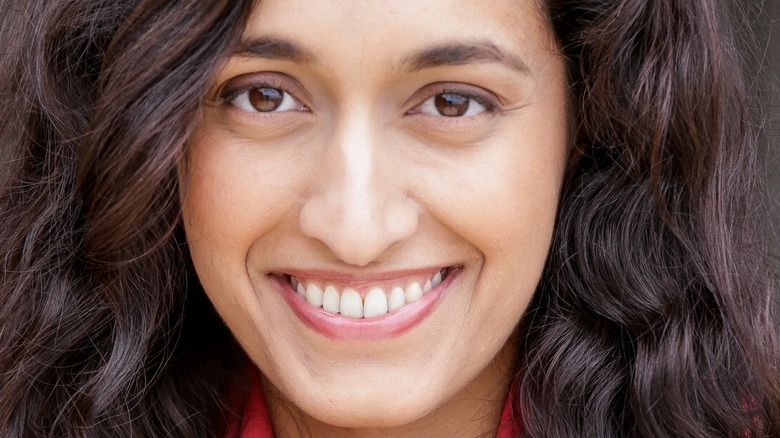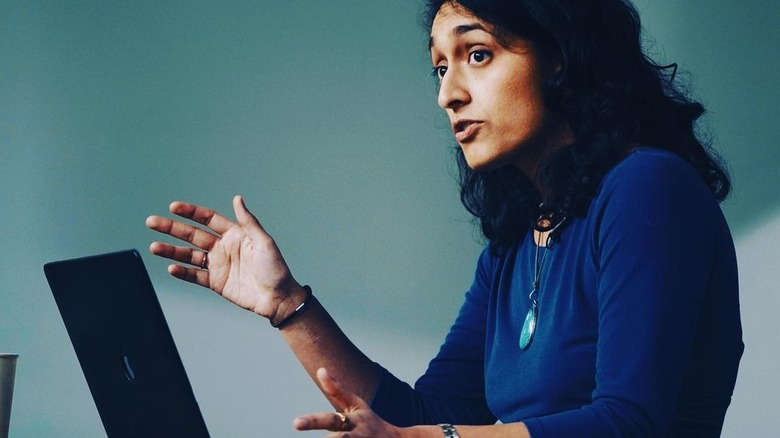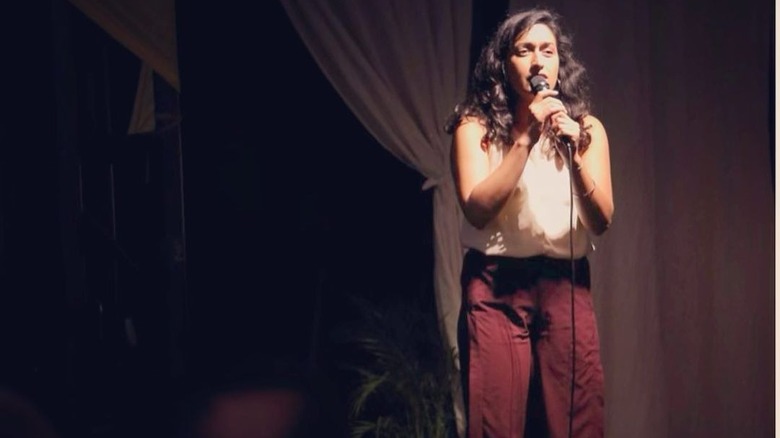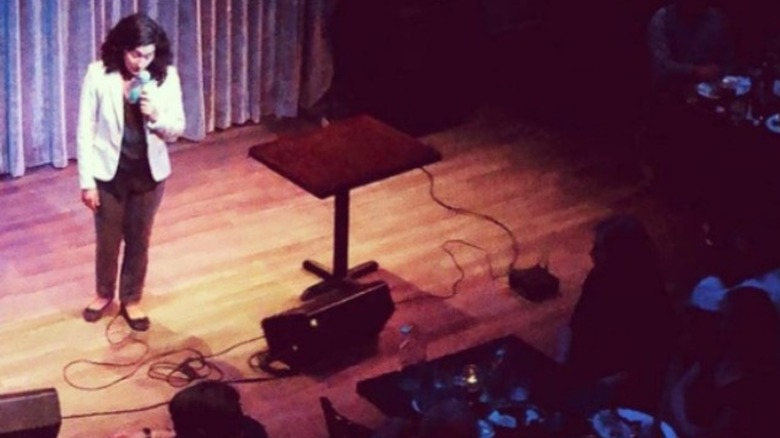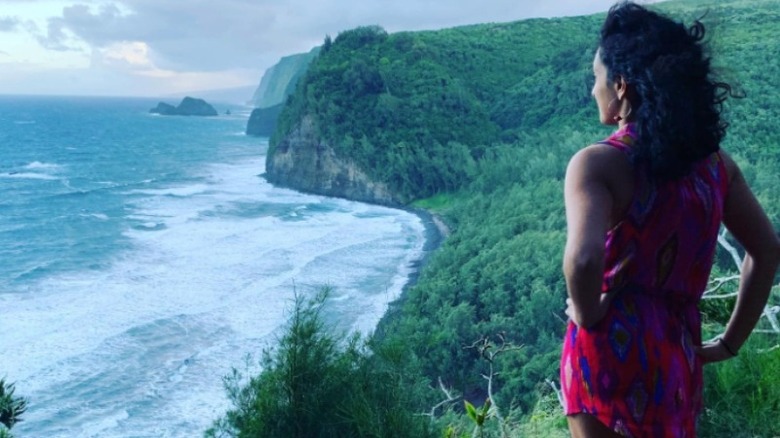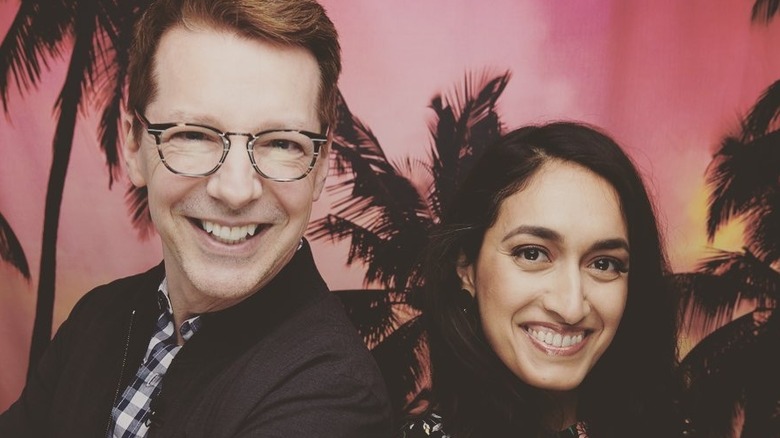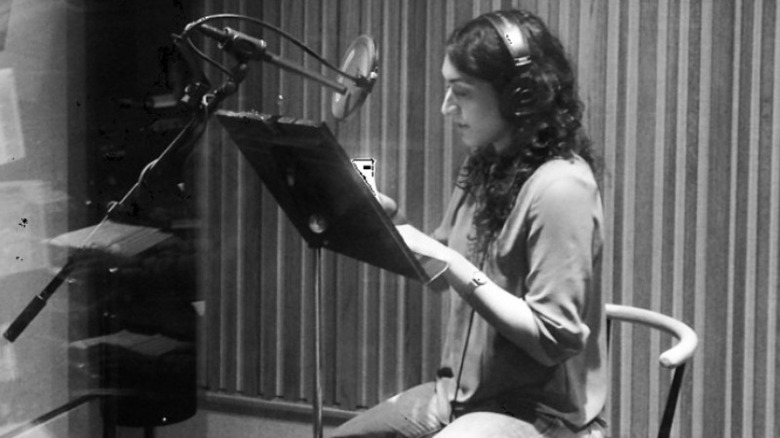Dr. Priyanka Wali, HypochondriActor Co-Host, Talks Mixing Comedy And Medicine – Exclusive Interview
Priyanka Wali has a very eclectic collection of careers. She's a doctor specializing in internal medicine and a stand-up comedian. And she combines both of those skillsets to co-host "HypochondriActor," a podcast with "Will and Grace" alum Sean Hayes.
Wali and Hayes team up to interview celebrity guests about their unique, incredible, and riveting medical stories. They also quiz each other about medical diagnoses, share interesting medical history trivia, and, of course, share more than a few laughs. Since the podcast launched in October, the duo has interviewed A-listers like Miranda Cosgrove, Idina Menzel, Conan O'Brien, Tia Mowry, and Henry Winkler. They've covered topics from endometriosis to dyslexia and everything in between.
In an exclusive interview with Health Digest, Wali explains how comedy and medicine are the perfect partners — much like her and Sean Hayes. Plus, she reveals what it's like to be a medical professional during a global pandemic.
Continuing a long legacy of healing
Tell us a little about your background. How did you find yourself pursuing medicine?
"Pursuing" is an interesting choice of words. The truth is I come from a long line of healers. My parents, aunts/uncles on both sides, and the overwhelming majority of cousins are physicians. In fact, if you look up the last name "Wali" under California medical license, every last name that comes up is somehow related to me except for like two people.
Even ancestrally, there are healers in my family. My great-grandfather was one of the first anesthesiologists in Kashmir. And if you go farther down the family line, the last name "Wali" was a name that was bestowed upon us after someone even farther up the ancestral line did some good acts for the community and our family name changed to "Wali," which means "helper" in Arabic.
So I like to joke that I came out of the womb holding a stethoscope! By the time I was born, it was pretty much certain that I was going to go into medicine. Science always fascinated me and came easily to me and with the background I had, it was pretty much a done deal.
How did you choose your specialty?
When I first graduated medical school I actually thought I wanted to be a neurologist. I matched into my first choice in a neurology program at OHSU in Portland, Oregon. As part of neurology training, you do one year of internal medicine training before moving on to neurology. It was during that year in internal medicine that I realized that I loved everything about internal medicine, which is the general specialization in adults.
One of the things that I love about internal medicine is the emphasis on the whole body and the whole person as opposed to choosing a specialization that focuses on one particular organ or body system. I'm obsessed with health optimization and biohacking as well as all aspects of preventive medicine. So many vicious diseases can be prevented early with lifestyle changes and to me, that seems like one of the easiest things that we can do as a society and myself personally as a doctor to prevent diseases from progressing.
You've been investigating hallucinogenic drugs like ketamine to treat depression. Can you tell us a little bit about that work?
Psychedelics, which have been part of Indigenous/traditional healing practices for centuries, have enormous potential to address medical needs in the community and improve health outcomes. I'm currently a researcher at the Translational Psychedelic Research (TrPR) Program at University of California at San Francisco.
We are in the process of studying the use of psilocybin as a single medication for depression. We have also started a study looking at the effect of psilocybin on people with Parkinson's disease. Ketamine, a synthetic psychedelic, is currently FDA approved for treatment-resistant depression and I offer ketamine-assisted psychotherapy in my own private practice for patients with treatment-refractory depression.
If you could change one thing about our current medical system, what would it be?
There are so many things that I would like to change about our current medical system. If I had to pick one thing, it would probably be that I wish we treated physicians and our medical students better. In the sense [that] I wish the system wasn't so oppressive towards physicians.
According to the American Psychiatric Association, one physician commits suicide every day in the U.S., making it the highest suicide rate of any profession in the U.S. If the system can't even take care of our own healers, how can we healers be expected to take care of other patients?
Becoming a comedian
You're also a stand-up comedian! How did that become part of your life?
The 'seed' idea of becoming a stand-up comedian came to me over nine years ago amidst the depths of sadness as I was processing a breakup. I remember clearly how much pain I was in from the end of that relationship and from the depths of my tears, the tiniest voice deep inside of me said, "I want to make people laugh." I was rather surprised to hear this especially because performing stand-up had always been a morbid fear of mine. I immediately ignored the voice. In hindsight, I was actually just afraid of what would happen if I actually listened to it. That's the thing about things you resist. What you resist, persists.
So the seed, inevitably, continued to grow. I started to experience dreams and aural visions where, as I would fall asleep at night, I would hear the sound of applause. I'd close my eyes and see a dark theater where I cannot see anything, and I would hear applause, whistling, and cheering. Applause would be the last thing I would hear before I'd drift off to sleep. This went on for months. The seed just kept growing so much that one day I finally just decided to try stand-up comedy once and for all to put an end to these strange dreams.
Landing her first big stand-up gig
Priyanka Wali on stepping up to the mic...
The plan was to face this fear of mine and move on with my life. And it was intended to be a one-time thing — an abrupt one-off bucket list event, and then never to be thought of again. I Googled "Good place to try stand-up comedy for the first time in San Francisco" and a website popped up for a laundromat/open mic café. You could tell jokes in front of people folding their laundry. I remember the deep fear that was in my bones as I drove to the open mic. I told myself that I am going to just do this once and then I never have to feel this fear again.
I showed up at the open mic, there were three-minute sets. I had written three minutes of jokes before arriving. I went up on stage and I did my three minutes. In hindsight, as someone who has performed stand-up comedy for over eight years now, I can tell you the jokes weren't funny but they were well-received by the audience regardless.
As I got off stage, trembling and relieved, the M.C. pulled me aside and told me I was noticed by a local show producer who was watching in the audience. I met with the producer after my set; he told me he thought I was really funny and he wanted to put me on his showcase which was in one month's time. I was in total shock. I couldn't believe that not only did I just face my fear of performing stand-up comedy but it was [so] well-received that I was getting a second gig out of what was supposed to be a one-time event.
I asked the producer how much time he would want me to do for that show in a month. He said 10 minutes. I calmly responded "no problem" to the booker but inside I started freaking out because he wanted me to perform 10 minutes and I hardly had 10 seconds worth of good material. I knew I would have to practice in order to be ready for that showcase in a month. So I attended more open mics for the next month in order to prepare for that showcase. But what ended up happening is that at those open mics, there would be other bookers watching and they ended up booking me for their showcases too.
So by the time I did the showcase that was supposed to be one month out, I had all these other showcases lined up too. And the next thing I knew, I was deep into the world of stand-up comedy. Things grew as I was offered more opportunities to perform and expand as an artist. Stand-up eventually led to work in acting, voice-over, and podcasting too. Over the last nine years before COVID, I have had the pleasure of performing all over the world for all sorts of audiences.
I've changed a lot as an artist. I started out telling very dumb superficial jokes and now I'm working more towards social justice/activism with my voice. My ultimate goal has always been to meld comedy and medicine and that is showing up today with a few different avenues, most recently "HypochondriActor."
Practicing medicine and comedy go hand in hand
Most of your stand-up is about being a doctor. Does comedy help you process the day-to-day difficulties of being a doctor?
Sometimes it does, but there are certainly times where it's harder to laugh. This especially holds true since our world has changed in 2020. I am usually quite serious in the office with patients; stand up comedy is my one place where I can let loose and not have to be serious. My time on stage is protected time for me to just mess around.
If anything, I think practicing medicine has prepared me a lot more for processing the challenges of being a stand-up comedian. The grueling hours during residency prepared me with the hours and hours I've spent at indie comedy venues, dive bars, and comedy clubs to hone my material.
What's it been like to be a practicing doctor during the pandemic?
Very challenging. It is imperative that I take care of myself so that I can have the capacity to hold space for my patients. I was personally affected by the pandemic because I have so many family members who are physicians, some of whom work in ICUs or ERs.
It was brutal to face the reality that given the profession my family and myself were in — there was a real possibility that I could potentially lose literally every single member of my family to COVID. My entire lineage. That was a hard realization.
Life is fragile and short and this pandemic has taught me, as well as so many others, how to be grateful for every day that you have with your loved ones.
Being a doctor, a stand-up comedian, and a podcaster is a lot. How do you find the balance in your life?
The thing about finding balance in one's life is that even if you think your life is in balance, the Universe will always show you where there are always opportunities to grow and find even more balance.
Practically speaking, I am good at time management. But more importantly, I try to set time aside for daily mindfulness. That includes some sort of activity that allows me to connect with my body, usually a somatic practice of some sort like dancing or a somatic movement. Meditation helps too. That's the only way I can sustain my energy to do all of the activities that I do.
Socialization is also an important aspect of wellness. I am an aunt and family is really important to me so I like to set aside time to spend with my nephew and be with family, usually on the weekends.
The birth of the HypochondriActor podcast
How did you hook up with Sean Hayes to do the "HypochondriActor" podcast?
I'm so grateful to have met Sean! I was first approached by Hazy Mills Productions, Sean and Todd Milliner's production company, in 2019. They were familiar with my stand-up and my work and wanted to collaborate in some capacity. I first met Todd and it was an instant connection.
When the pandemic hit and Hazy Mills decided to start a podcast, that's when I finally met Sean and we've been friends since then. Sean has always been fascinated with medical stories and we both wanted to create something educational and entertaining so HypochondriActor was the perfect fit for our interests.
Tell us a little more about the podcast. What are you hoping that listeners learn?
The podcast is the perfect blend of medicine and comedy. We have celebrities sharing vulnerable stories of times they were ill or had near-death experiences. The goal is to connect human beings with each [other] and show that these stories are relatable no matter who you are. Sharing vulnerable stories connect us.
My hope is also to give listeners high-quality medical information but also doing it in an informative and entertaining way. I've gotten messages from medical students and nursing studies saying they've actually used the podcast to help them study for their exams, as a way to learn things when they are relaxing or have some downtime. We've even had some people send us messages and calls saying that listening to our podcast they were able to get some answers for certain medical problems that they had been struggling with.
It's never the intention to give personalized medical advice on the podcast, but it's always really humbling to reach messages like that where you've actually made a difference in people's lives through something as silly as a podcast.
How do you bring your passion for diagnostics to the podcast?
It's second nature. Since starting medical school, I've always been passionate and focused on understanding the root cause or etiology of certain medical issues. A good internist is really a good diagnostician so, when I am listening to celebrities talk about their medical issues, I'm not just listening with my brain/intellect but I'm also listening with my whole body. I'm really paying attention not just to what they are saying, but how it is being said and asking myself what is the emotion behind whatever information that is being conveyed. Is it fear? Anger? All of those play a role in "diagnosing" someone's medical illness.
Sometimes we focus so much on the scientific facts behind a specific disease and we forget that there is a human being with feelings and emotions, who is being impacted by the disease we are discussing. That's why I like to focus the interview on the emotional experience of having that particular illness. Because regardless of whether another listener has the illness or not, we can all relate to the core emotion, for example, feeling scared and vulnerable. That connects all of us as human beings.
HypochondriActor: past and future
Which episode of "HypochondriActor" has resonated with you the most so far?
I've loved recording each and every episode but some episodes deeply resonate with me. Interviewing Yvette Nicole Brown about her diabetes meant a lot to me personally because diabetes affects 10% of the U.S. population and I've lost family members to complications of diabetes.
I also have personally looked up to Dr. Sanjay Gupta as a physician myself so meeting him and getting to interview him was a real honor. I also really looked up to Conan O'Brian when I was in high school and meeting him in person was unfortunately really anti-climatic and frankly very disappointing. I'm just kidding — love you, Conan!!
Can you give us any sneak peeks for "HypochondriActor" 2022?
We will continue to have amazing guests on the show with topics we haven't yet talked about. We are also going to bring some of our listeners on the show so we can ask them questions and hear more details about their incredible stories. We really want to hear directly from our listeners, so there will be more ways for them to let us know what they want to hear about this year.
New episodes of "HypochondriActor" are available every Wednesday on Apple Podcasts, Spotify, or wherever you listen to podcasts.

